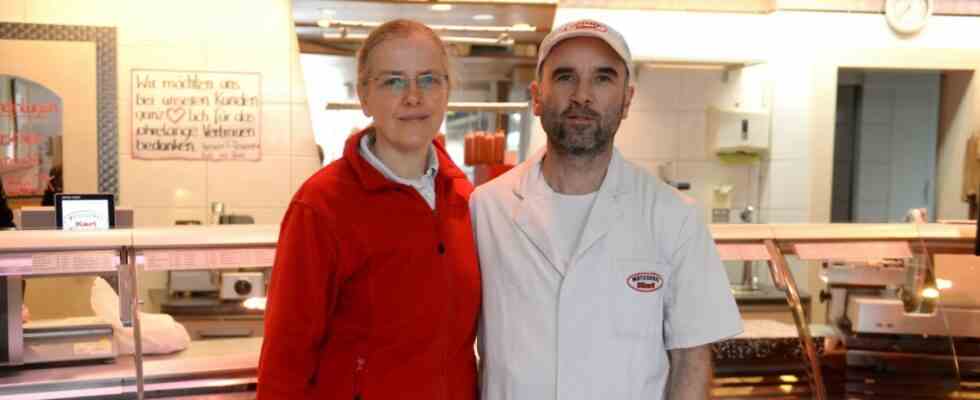The sign is clearly visible on the door of the shop at Münchner Strasse 23 in Garching: “Dear customers, unfortunately it didn’t work out with a successor. That’s why our last opening day is now finally January 28th (Saturday)”. For more than 54 years, since August 1969, the Karl family has been selling salmon ham, Regensburger, meatballs and pasta salad at this address to their customers from Garching and further afield, most of them from their own production right behind the shop. Now Hermann Karl closes his butcher’s shop. It’s not easy for him, you can hear that. “It doesn’t help anything,” says Karl.
Hermann Karl’s parents founded the butcher’s shop in Garching in 1969, and since 1998 his son has continued the business with production and sales. The family tradition will now end. “It’s almost impossible to find a successor,” says master butcher Karl. “We tried everywhere, through a trade newspaper, through the butcher’s school, with an offer of a stake or a takeover, but nobody got in touch.” Karl’s children don’t want to take over the business either, they have other career aspirations and know first-hand the high workload of the business owner. “I work 75 to 80 hours a week at peak times,” says Karl. “The only thing left for you to do is work and sleep, at some point that won’t be productive anymore.”
It was therefore time for the 51-year-old to pull the ripcord. “You get older, too,” he says. In addition to the heavy workload, there were other factors that led to this decision. More complicated supply chains; the uncertainty of the extent to which the drastic increase in energy prices will affect running costs.
The Karl butcher shop in Garching is closing on Saturday after 54 years.
(Photo: Robert Haas)
What’s more, customers are increasingly no longer going to the butcher’s shop, but to cheaper competitors. “If the customer takes his 200 grams of sausage with him when he goes to the supermarket for the week, I miss it. We make a living from the daily sale,” says Karl. Especially now, when money is tighter for many people due to inflation, butchers have noticed that more people are shopping in the supermarket again, affirms Hubert Gerstacker, training supervisor for the Munich butchers’ guild. “Our unique selling point as a butcher is the quality – but you don’t necessarily see it, you taste it first,” says Gerstacker. The butchers’ business tends to decrease while the costs, for example for meat and spices, increase.
In the case of a successor, there may also be a need to convert the existing business, says Gerstacker. And they can get expensive. Basically, the butcher trade is struggling with a problem of recruiting young people, both for master craftsmen and for skilled workers. It is becoming increasingly difficult to persuade young people to train in the profession. In the Munich butchers’ guild, which stretches from Garmisch-Partenkirchen to Erding, almost a hundred young women and men are currently being trained as butchers, and around 230 are training to become specialist salespeople. The number is stable, but nothing compared to the number of prospective mechatronics technicians or office clerks.
“You go into the store in the morning to get your raw goods and when you go out again in the evening, the finished, tasty sausages are hanging there.”
The consequence of all these factors: in 2022, numerous butcher shops in Bavaria closed. Gerstacker regrets that. He promotes his profession. “It’s an experience to create something with your own hands. You go into the store in the morning to get your raw goods and when you go out again in the evening, the finished, tasty sausages are hanging there,” says the master butcher. The skilled trades have to do even more to promote their training in order to attract young people and keep skilled workers in the companies, demanded Franz Xaver Peteranderl, President of the Chamber of Trades for Munich and Upper Bavaria.
To make it easier for companies to find a successor when they sell their business, the HWK offers company consultations free of charge. Christoph Molocher, deputy head of the business administration and law department, recommends that company managers plan at least three to five years for a good succession plan. “Finding a successor is basically not easy at the moment,” he says. “We have a shortage of skilled workers, and there are also about 8,200 companies in Upper Bavaria that will be taken over in the next five years.” In order to bring together those who are willing to hand over and possible successors, HWK digital operates a Bavaria-wide company exchange. In addition, the chamber offers to determine the company value for negotiations free of charge and to support transferors and transferees with financing issues, from the organization of loans to questions of old-age provision.
Butcher Karl from Garching wants to reduce his working hours in the future, possibly joining a colleague. However, he and his employees will continue to produce their fresh meat and sausage products up to and including Friday and will sell them until Saturday. After that, customers in Garching still have the Stadler butcher shop and the Vinzenzmurr branch.

